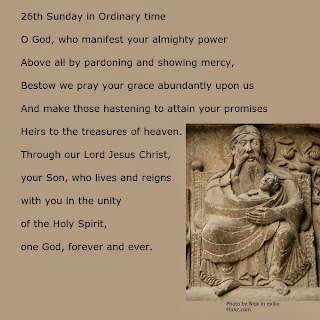Amaziah, the priest of Bethel, sent word to Jeroboam,
king of Israel:
“Amos has conspired against you here within Israel; the country cannot endure all his words.For this is what Amos says: Jeroboam shall die by the sword, and Israel shall surely be exiled from its land.”
The prophetic spirit, as described in the Bible, gives us the ability to receive the truth, and even to welcome it. The Jews recalled that willingness even in the gentile prophet Balaam who was hired to lay a curse on the Egyptian escapees but could not do it because he could say only,
"The oracle of one who hears what God says, and knows what the Most High knows, Of one who sees what the Almighty sees, in rapture and with eyes unveiled..."
Amos, unlike Balaam, was not a professional prophet. He was "a shepherd and a dresser of sycamores." Nor was he from Israel, and that made him doubly unwelcome. He came from Judah to warn the Israelites of doom if they failed to keep to the covenant with the Lord.
Because all Christians are anointed with the prophetic spirit of Jesus, we are sent to the nations to announce the Gospel. Our announcement must include both the invitation to know the Lord and warnings about the sins we encounter. We despise the idolatry of pagan nations, the violence of warlike nations, the racism of segregated societies, and the vanity of excessive wealth.
Because our values are shaped by the gospel and our perception of what is truly valuable, we can be obnoxious to the societies that receive us. We just don't get some things. We might enjoy the food, the music, the dance, and the arts; but we're not amused by greed, lust, and avarice. Nor do we fear what our neighbors fear. In fact, given to trusting God, we don't fear much. And we are often willing to trust and admire pariahs despised by our host societies.
When we engage in politics, as we must, we're liable to hear an echo of "Off with you, visionary, flee to the land of Judah!" In the 1960's, the rebuke was to keep religion out of politics and politics out of religion. And the Church out of the bedroom! Today it's "spiritual but not religious." and "I'm not a religious person."
No human society conforms completely to the Gospel, neither the United States, nor Italy, nor a monastery of Catholic monks. The best efforts of Utopian societies fall short. No political party can pretend to follow the Gospel since it must win the support of a significant minority to be effective. Always the Gospel challenges our sinful tendencies and invites us to “Strive to enter through the narrow door, for many, I tell you, will attempt to enter but will not be strong enough."
When we meet opposition we're especially likely to cease striving. It doesn't feel like the right way. Apparently good and reasonable people argue against the truth that we must live. We become confused and uncertain and wish to fall back into pleasant, anonymous conformity with folks around us. Very often, we realize they're right about some things. (How long has it taken the Church to recognize the changing climate and the human causes of that change? And why did it take so long?)
So we learn to listen both as God speaks to us in the Scriptures, Tradition, the Magisterium, and personal prayer; and to wiser heads around us in the world. Taught by the Holy Spirit, we develop a taste for the truth. We know when it feels right. Prophets like Amos, Elijah, Jesus, Mary, and Saint Paul inspire us to hear the truth that sets us free.















